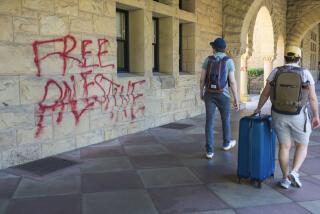Four animal activists arrested for allegedly harassing UC researchers
- Share via
SAN FRANCISCO — Four animal activists have been arrested for their alleged roles in attacking and harassing animal researchers at UC Berkeley and UC Santa Cruz over the last 18 months, the FBI announced Friday.
The arrests are a breakthrough in the investigation of attacks against a number of University of California animal researchers that have long frustrated police and school officials. None of the suspects, however, was charged with participating in the most serious violence against UC scientists, including the firebombing of the homes of researchers at UCLA and UC Santa Cruz.
Extremists’ attacks at the three UC campuses have been intended to halt researchers’ use of animals in experiments, according to a website that advocates violent action to protect lab animals. UC officials defend their researchers, arguing that the use of animals in experiments is carefully regulated and essential to advancing medical science.
“With so many legal options to make their voices heard and to effect policy change, it is inexcusable and cowardly for these people to resort to terrorizing the families of those with whom they do not agree,” said Charlene B. Thornton, special agent in charge of the FBI’s San Francisco office.
The FBI identified the four suspects as Adriana Stumpo, 23, of Long Beach, Nathan Pope, 26, of Oceanside, Joseph Buddenberg, 25, of Berkeley and Maryam Khajavi, 20, of Pinole.
Pope and Stumpo were arrested Thursday in Charlotte, N.C., as they returned to the United States from Costa Rica. Buddenberg and Khajavi were arrested Friday in Oakland.
Pope, Stumpo and Khajavi were accused of being among a group of protesters who attempted to force their way into a UC Santa Cruz professor’s home during a children’s birthday party last February.
When the professor’s husband opened the door, he was hit by an object, authorities say.
Pope, Stumpo and Buddenberg are charged with publishing the names and addresses of several UC Santa Cruz scientists in July in a flier that read: “animal abusers everywhere beware we know where you live we know where you work we will never back down until you end your abuse.”
Soon after, the homes of two researchers on the list were firebombed. Those incidents remain under investigation.
Jim Burns, a UC Santa Cruz spokesman, praised the FBI and the Santa Cruz Police Department for their part in pursuing and arresting the four.
“Their persistence these many months speaks to the seriousness of the threat against our researchers whose work is shedding light on diseases such as cancer and Parkinson’s,” Burns said.
The FBI alleges that Pope, Stumpo and Buddenberg also were among a group of about 20 activists who harassed a UC Berkeley professor at his home in El Cerrito in October 2007. The group, some wearing bandannas to hide their faces, trespassed in his yard and accused him of being a murderer because of his research.
The FBI accused all four suspects of being among 11 protesters who harassed several UC Berkeley researchers during demonstrations at their homes during the course of a single day in January 2008.
UC Berkeley spokesman Dan Mogulof said the university in recent years has been plagued by activists harassing researchers at their homes, labs and around campus. Police documented 158 such incidents between August 2007 and December 2008, he said.
“We find that intolerable and abhorrent,” Mogulof said. “We hope that the arrest of these suspects will send a clear and powerful signal to extremists who continue to engage in dangerous and illegal actions against university researchers.”
The federal Animal Enterprise Terrorism Act provides for up to five years in prison for interfering with an animal enterprise through harassment, vandalism, criminal trespass, threats or intimidation.
Santa Cruz Police Chief Howard Skerry also praised the arrests.
“This sends a strong message that our community won’t tolerate this type of senseless violence,” he said. “You have absolutely no right to attack a family in the sanctity of their home.”
--
More to Read
Sign up for Essential California
The most important California stories and recommendations in your inbox every morning.
You may occasionally receive promotional content from the Los Angeles Times.













